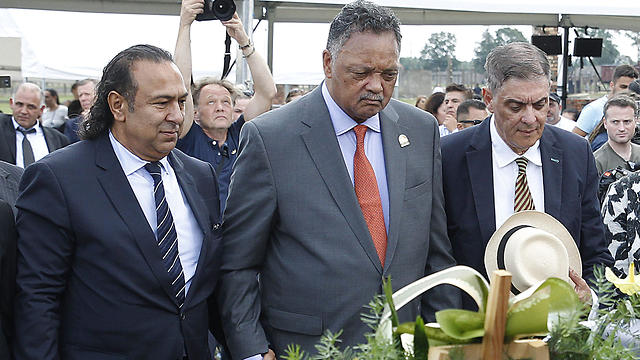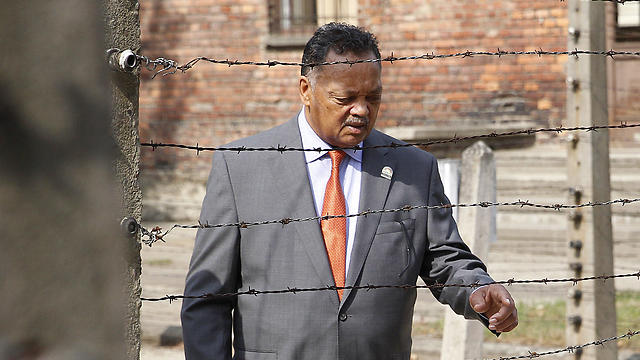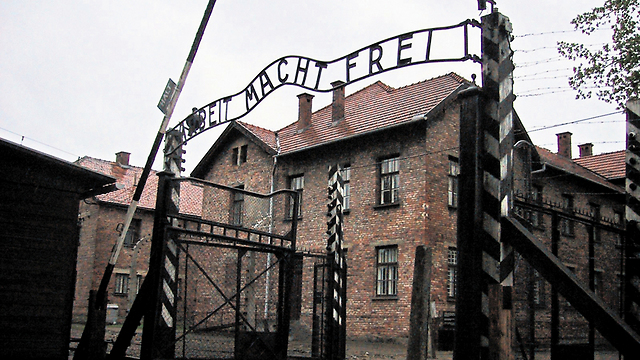
Long ignored, Roma genocide mourned 75 years on at Auschwitz
Some 20 survivors, most Roma and Sinti but also some Jewish, attend commemorations that fall exactly 75 years after thousands of the last remaining prisoners in the so-called 'Gypsy family camp' were killed at the Nazi death camp in Poland
OSWIECIM, Poland -- The American civil rights activist Rev. Jesse Jackson gathered Friday with survivors, some Jewish, at the former Nazi death camp of Auschwitz-Birkenau to commemorate an often forgotten genocide -- that of the Roma people.
In addition to the 6 million Jews killed in camps such as Auschwitz, the Nazis killed other minorities during World War II, including between 250,000 and 500,000 Roma and Sinti.

Other dignitaries set to attend Friday's observances are German deputy foreign minister, Michael Roth, who ahead of his visit lamented the lack of broad knowledge about the systematic murder of the Roma communities during World War II.
"For too long we have pushed the genocide of over 500,000 Sinti and Roma out of our historical memory and allowed the largest ethnic minority in Europe to be pushed to the margins of our society," Roth said recently.
"We have the responsibility to ensure that the stories of the victims' suffering not be forgotten and that anti-Gypsy prejudices disappear from people's minds."
The commemorations in southern Poland, which was under German occupation during World War II, fall exactly 75 years after thousands of the last remaining prisoners in the so-called "Gypsy family camp" at Auschwitz-Birkenau were killed.
Organizers said that some 20 survivors, most of them Roma and Sinti but also some of them Jewish, were joining Friday's commemorations, which have been organized by the Central Council of German Sinti and Roma and the Roma Association in Poland in cooperation with the Auschwitz-Birkenau State Museum.

Despite their immense suffering, it took decades for them to achieve even small measures of recognition and justice.
It was only in 1982 that West German Chancellor Helmut Schmidt publicly declared that Sinti and Roma "were persecuted for reasons of race" and that "these crimes constituted an act of genocide."
More progress has come of late. In 2012, Germany erected a memorial in Berlin. Three years later, the European Union's Parliament declared August 2 to be "European Roma Holocaust Memorial Day."
And this year ahead of International Roma Day on April 8, a bipartisan resolution was introduced in the U.S. Congress that said "Roma enrich the fabric of our nation" and that they have been "part of every wave of European migration to the United States since the colonial period, tying our country to Europe and building the transatlantic bond."
In a statement Friday, U.S. Secretary of State Mike Pompeo called "on all governments to take steps to combat intolerance against the Roma and to enable their full participation in civic and economic life."
Recently, Pope Francis has highlighted the discrimination the Roma still face today, even in Rome.
This week, some of Europe's top human rights leaders also reflected on the genocide.
"The horrors of the Roma Holocaust are an undeniable part of our history, but for a long time Europe has turned a blind eye on to what had happened," said Thorbjorn Jagland, the secretary general of the Council of Europe, the continent's top human rights body.
"We have the duty to end the silence that has lasted for decades."











